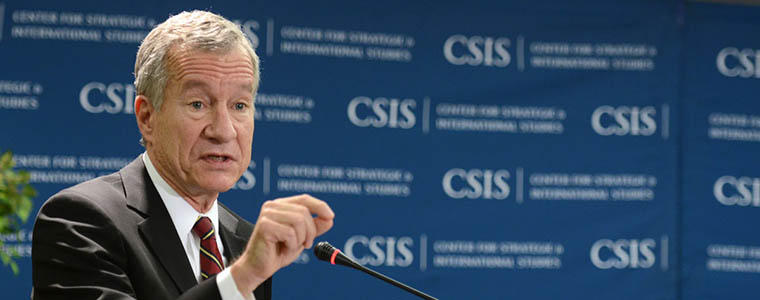USIP President Jim Marshall spoke at the Center for Strategic and International Studies (CSIS) on March 11 for the release of a new report, “U.S. Navy Humanitarian Assistance in an Era of Austerity.” Marshall delivered the keynote address and participated in a panel discussion with Admiral (ret.) Gary Roughead (Hoover Institution), Rear Admiral (ret.) Thomas Cullison (CNA Institute for Public Research), and moderated by CSIS’s Dr. J. Stephen Morrison.

The report is the product of a year-long effort led by Admiral Roughead and the CSIS Global Health Policy Center. It argues that U.S. Navy proactive humanitarian engagement—missions that go beyond U.S. Navy response to natural disasters to include more sustained and strategic engagement through planned aid projects—is valuable and should be continued. The report further notes that under increasing budget pressure, the performance of these missions must be enhanced, long-term sustainability must be taken into account, and the Navy must find ways to clarify goals, demonstrate impact, and improve funding practices and policies in the future. Moreover, the report calls for expanded planning time that integrates a wider range of actors, including with other U.S. government agencies and potential nongovernmental (NGO) partners.

In his keynote, Marshall underscored the importance of “soft power,” especially during a time of federal budget constraints. He argued that sustained programs like U.S. Navy proactive humanitarian engagement are important pieces of U.S. foreign policy and national security interests. Nevertheless, Marshall said, a core challenge now is how to monitor and evaluate the effectiveness of these programs and, importantly, how to communicate impact to funders—notably the U.S. Congress. Marshall argued that in today’s fiscal and political environment, in which it is increasingly difficult to convince many in Congress and elsewhere of the value of funding foreign aid, “it’s never been more important to demonstrate the effectiveness of soft power” as a means to advance U.S. interests. In particular, he underscored the need for planners and funders to reassess the appropriate mix of military and civilian capabilities in meeting U.S. soft power objectives.
While the military can and should play a key role, adequately funding civilian engagement projects over potentially more costly military deployments could lead to meeting core objectives at lower cost. Leveraging capabilities, increasing budget flexibility, and legitimizing the actions of partners and actors—particularly those that are low-cost, high-impact—across a variety of sectors are increasingly important to meeting these goals.
Explore Further
- Guidelines for Relations Between US Armed Forces and NGHOs in Hostile or Potentially Hostile Environments
- Guiding Principles for Stabilization and Reconstruction
- USIP and the U.S. Army Team Up For How-To Guide on Stability Operations
- USIP Launches Roundtable Series with Asia-Pacific Naval Attaches
- Strengthening the Civilian-Military Link: USIP and Navy-Marine Corps Coordination
- Navy's CNO Visits USIP